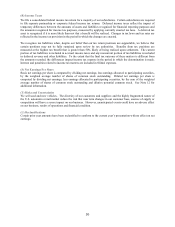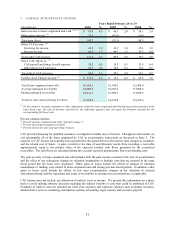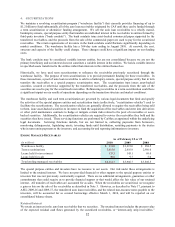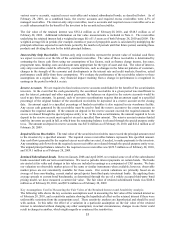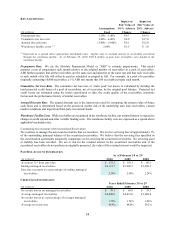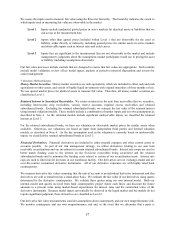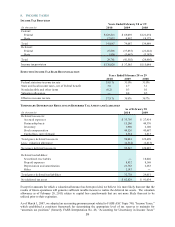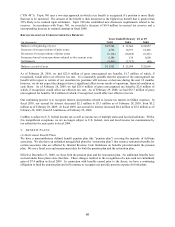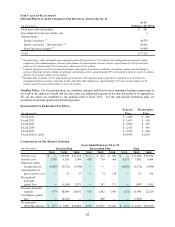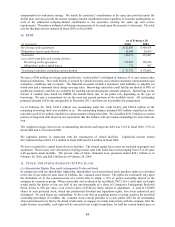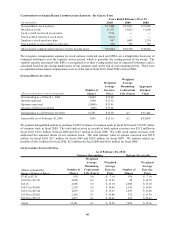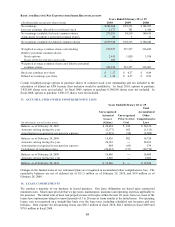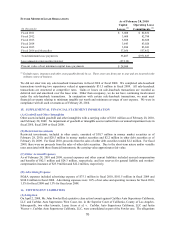CarMax 2010 Annual Report Download - page 70
Download and view the complete annual report
Please find page 70 of the 2010 CarMax annual report below. You can navigate through the pages in the report by either clicking on the pages listed below, or by using the keyword search tool below to find specific information within the annual report.
60
(“FIN 48”)). Topic 740 uses a two-step approach in which a tax benefit is recognized if a position is more likely
than not to be sustained. The amount of the benefit is then measured as the highest tax benefit that is greater than
50% likely to be realized upon settlement. Topic 740 also established new disclosure requirements related to tax
reserves. In accordance with Topic 740, we recorded a decrease of $0.4 million in accrued tax reserves and a
corresponding increase in retained earnings in fiscal 2008.
RECONCILIATION OF UNRECOGNIZED TAX BENEFITS
(In thousands)
Balance at beginning of year 25,584$ 32,669$ 24,957$
Increases for tax positions of prior years 4,756 10,757 12,485
Decreases for tax positions of prior years (5,114) (10,265) (6,321)
Increases based on tax positions related to the current year 6,186 136 1,608
Settlements (9,460) (7,713) (60)
Balance at end of year 21,952$ 25,584$ 32,669$
2009 2008
Ye ar s Ende d Fe bruar y 2 8 or 2 9
2010
As of February 28, 2010, we had $22.0 million of gross unrecognized tax benefits, $1.7 million of which, if
recognized, would affect our effective tax rate. It is reasonably possible that the amount of the unrecognized tax
benefit with respect to certain of our uncertain tax positions will increase or decrease during the next 12 months;
however, we do not expect the change to have a significant effect on our results of operations, financial condition or
cash flows. As of February 28, 2009, we had $25.6 million of gross unrecognized tax benefits, $2.6 million of
which, if recognized, would affect our effective tax rate. As of February 29, 2008, we had $32.7 million of gross
unrecognized tax benefits, $2.8 million of which, if recognized, would affect our effective tax rate.
Our continuing practice is to recognize interest and penalties related to income tax matters in SG&A expenses. In
fiscal 2010, our accrual for interest decreased $2.1 million to $3.1 million as of February 28, 2010, from $5.2
million as of February 28, 2009. In fiscal 2009, our accrual for interest decreased $0.4 million to $5.2 million as of
February 28, 2009, from $5.6 million as of February 29, 2008.
CarMax is subject to U.S. federal income tax as well as income tax of multiple states and local jurisdictions. With a
few insignificant exceptions, we are no longer subject to U.S. federal, state and local income tax examinations by
tax authorities for years prior to fiscal 2004.
9. BENEFIT PLANS
(A) Retirement Benefit Plans
We have a noncontributory defined benefit pension plan (the “pension plan”) covering the majority of full-time
associates. We also have an unfunded nonqualified plan (the “restoration plan”) that restores retirement benefits for
certain associates who are affected by Internal Revenue Code limitations on benefits provided under the pension
plan. We use a fiscal year end measurement date for both the pension plan and the restoration plan.
Effective December 31, 2008, we froze both the pension plan and the restoration plan. No additional benefits have
accrued under these plans since that date. These changes resulted in the recognition of a non-cash net curtailment
gain of $7.4 million in fiscal 2009. In connection with benefits earned prior to the freeze, we have a continuing
obligation to fund the pension plan and will continue to recognize net periodic pension expense for both plans.


